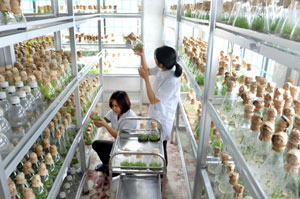The biggest problem research centres in Viet Nam faced was not a shortage of funding or infrastructure, but a lack of enthusiasm, he said.
Son went on to list regulations he considered unreasonable: regular wage increases based on working experience, formalistic assessments of staff performance [where the assessment was not based on real performance or efficiency at work], insufficient encouragement for staff to improve foreign language skills.
Moreover, when working in co-operative projects with international organisations, State employees were not given any further financial support, even though competent human resources could really drive the growth of agriculture, he said.
For many years, Viet Nam's agricultural growth rate has increased about five per cent annually, mostly thanks to input factors like land, water, labour and materials.

Dr Vu Van Liet from Ha Noi Agriculture University noted that experienced scientists with insufficient foreign language skills found it hard to work with foreign partners, while junior scientists with the requisite language abilities lacked experience.
As a result, co-operative work would not be as effective as expected, he said.
Meanwhile, Dr Le Quoc Thanh, director of Centre for Technology Transfer and Agriculture Extension under Viet Nam Academy of Agriculture Science, said that the technology transfer sector was also short of trained staff.
Most of those working in the sector had originally worked in other fields, so they lacked expertise in technology transfer, he said.
He noted that the faster technology was transferred to farmers, the more economic value farmers could generate.












